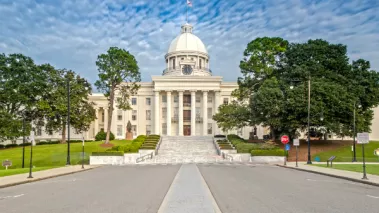Table of Contents
Alabama governor signs bill into law to better protect student and faculty free speech rights

The Alabama State House in Montgomery, Alabama
Yesterday, Gov. Kay Ivey of Alabama signed HB 498 into law, codifying protections for college students’ First Amendment rights on campus. The bill, which passed both chambers with bipartisan support, includes language emphasizing that “freedom of expression is critically important during the education experience of students, and [that] each public institution of higher education should ensure free, robust, and uninhibited debate and deliberation for students.”
Helpfully, HB 498 prohibits Alabama’s public colleges and universities from quarantining student expression in misleadingly labeled free speech zones. In doing so, the bill uses the same test that courts use to determine whether university time, place, and manner restrictions are constitutionally permissible. It ensures that any restriction on speech in the outdoor areas of campus must be “narrowly tailored to serve a significant institutional interest and employ clear, published, content neutral, and viewpoint-neutral criteria, and provide for ample alternative means of expression.”
Furthermore, the bill helps students and administrators understand the line between protected protests on campus and the unprotected “heckler’s veto” that materially and substantially disrupts another person’s free speech rights. The bill’s carefully crafted language sets forth:
That the public institution of higher education shall not permit members of the campus community to engage in conduct that materially and substantially disrupts another person’s protected expressive activity or infringes on the rights of others to engage in or listen to a protected expressive activity that is occurring in a location that has been reserved for that protected expressive activity.
To ensure that the bill does not unintentionally chill the speech of students who wish to engage in lawful protest, the new law further clarifies what does and does not constitute material and substantial disruption:
Conduct that materially and substantially disrupts shall not include conduct that is protected under the First Amendment to the United States Constitution or Article I, Section 4 of the Constitution of Alabama of 1901. Such protected conduct includes, but is not limited to, lawful protests and counter-protests in the outdoor areas of campus generally accessible to members of the public, except during times when those areas have been reserved in advance for other events, or minor, brief, or fleeting nonviolent disruptions of events that are isolated and short in duration.
Another key feature of the legislation is that it reins in overbroad anti-harassment policies. While addressing harassment on campus is both legally and morally necessary, overbroad policies are too often used to punish students who have engaged in protected speech. The bill provides a definition of student-on-student harassment borrowing most of its elements from the United States Supreme Court case Davis v. Monroe County Board of Education. However, it does not track the Court’s definition perfectly because it lacks a nexus to the targeted student’s membership in a protected class.
Another noteworthy provision in the bill is that it supports the freedom of association. It declares that “public institutions of higher education shall support free association and shall not deny a student organization any benefit or privilege available to any other student organization or otherwise discriminate against an organization based on the expression of the organization.” This protection ensures that student religious, political, and belief-based organizations of all stripes can organize around their missions and speak out on issues important to them without sanction from the institution.
Perhaps equally encouraging is HB 498’s requirement that new students, faculty, and staff be informed of these policies through their college’s orientation program. Institutions are required to disseminate these policies to the campus community at large, meaning that students and faculty will be better informed about their rights, and campus administrators will learn of their obligations to ensure free speech rights are not infringed.
Alabama becomes the 16th state to enact free speech legislation and the sixth — following Arkansas, South Dakota, Iowa, Kentucky, and Oklahoma — to join the list in 2019 alone. The legislation is set to take effect on July 1, 2020, and universities will have until then to update their policies to comply with the new law. FIRE stands ready to assist universities throughout this process, and as always, will provide our help for free.
FIRE looks forward to its official enactment and is encouraged by yet another state taking seriously the role of the First Amendment on college campuses. At least 250,000 public college students in the state of Alabama will benefit from the governor’s signing.
Recent Articles
Get the latest free speech news and analysis from FIRE.

FIRE's 2025 impact in court, on campus, and in our culture

The trouble with banning Fizz

VICTORY: Court vindicates professor investigated for parodying university’s ‘land acknowledgment’ on syllabus
